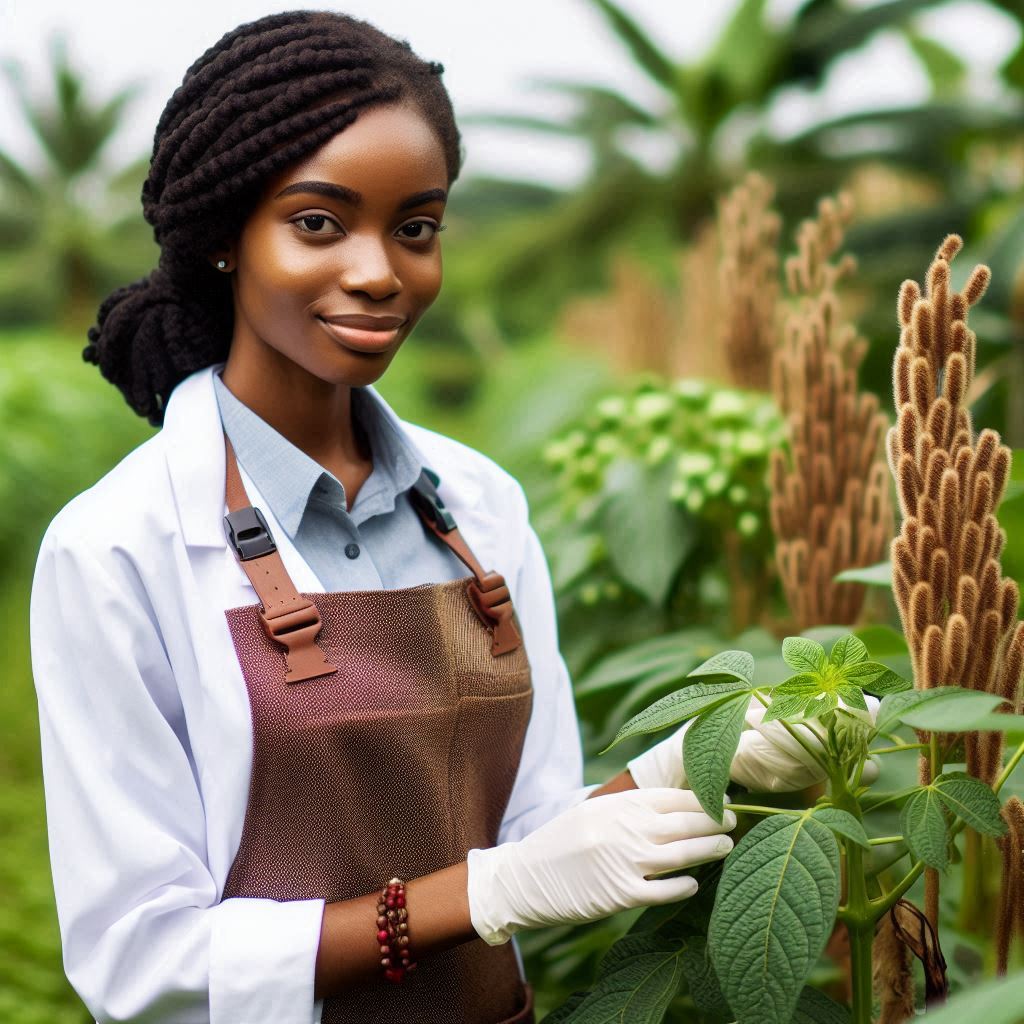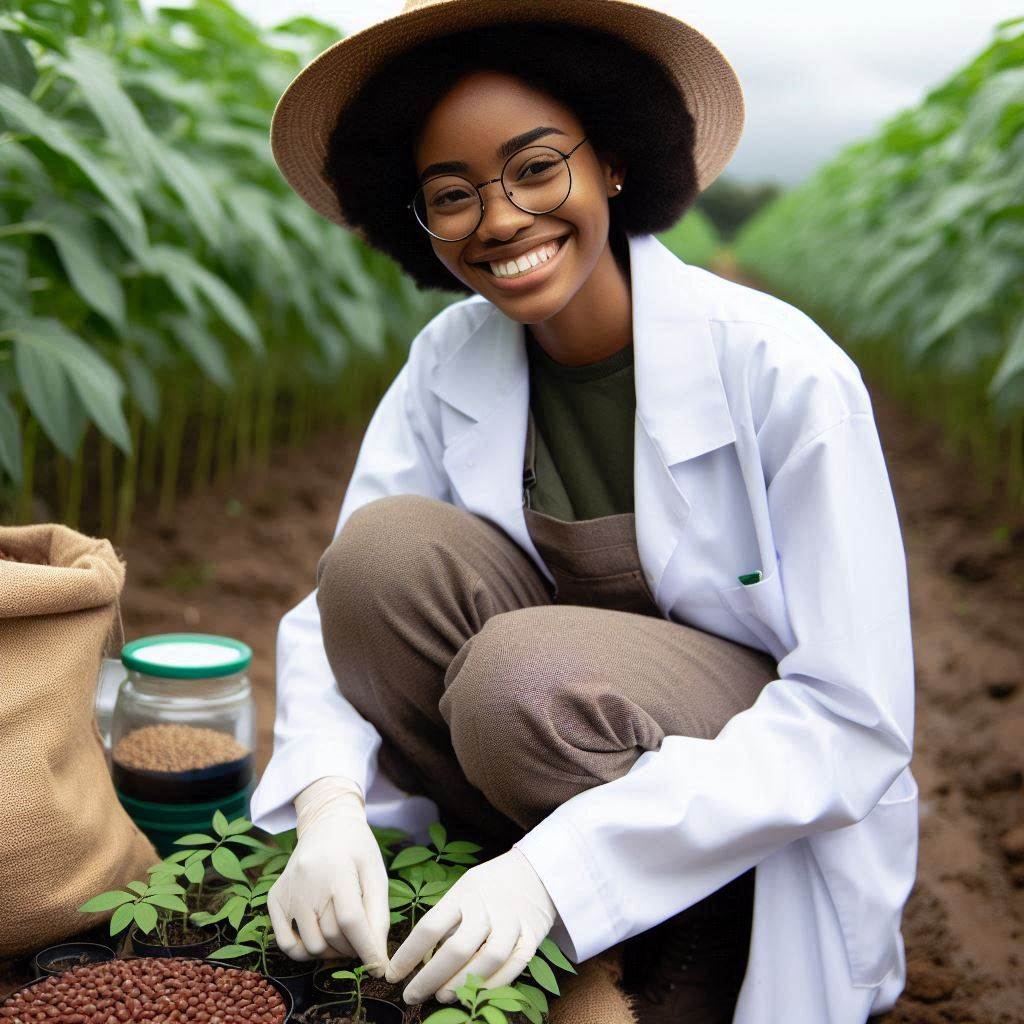Introduction
Plant breeding involves selecting and crossing plants to enhance desirable traits. Seed science focuses on the production and preservation of high-quality seeds. Both fields are crucial for advancing agricultural practices.
Importance of Plant Breeding
- Increases Crop Yield: Improved plant varieties produce higher yields.
- Enhances Disease Resistance: Breeding develops crops resistant to pests and diseases.
- Improves Quality: Selective breeding enhances the nutritional value and taste of crops.
Importance of Seed Science
- Ensures Seed Viability: Proper seed handling maintains germination rates.
- Preserves Genetic Diversity: Seed banks store diverse genetic materials for future use.
- Supports Sustainable Agriculture: Quality seeds reduce the need for chemical inputs.
Plant breeding and seed science are vital for Nigeria’s agricultural productivity. These fields ensure food security by providing farmers with superior crop varieties and reliable seeds. Investing in these areas promotes sustainable farming and economic growth.
Overview of plant breeding in Nigeria
Plant breeding in Nigeria has a long history dating back to traditional practices.
History of plant breeding in Nigeria
- Early farmers selected superior plants for propagation and cultivation.
- Formal breeding programs began in the colonial era with research stations.
- In the post-independence period, the government established research institutes for plant breeding.
Major crops targeted for breeding in Nigeria
- Cassava, a staple food crop, has been a major focus of breeding efforts.
- Other important crops include maize, rice, yam, sorghum, and cowpea.
- Vegetables and fruit crops are also being improved through breeding programs.
Achievements and challenges in plant breeding in Nigeria
- Improved varieties of crops have been developed that are resistant to pests and diseases.
- Yield potential and nutritional content of crops have been increased through breeding.
- Challenges include limited funding, infrastructure, and expertise in plant breeding.
- Climate change poses new challenges for breeding resilient crops in Nigeria.
- Collaboration with international organizations and research institutions is key to overcoming challenges.
Overall, plant breeding plays a vital role in ensuring food security and improving agricultural productivity in Nigeria.
Read: Innovations in Nigerian Horticulture
Seed science in Nigeria
Definition of seed science
Seed science is the study of seeds, their development, storage, and distribution, with the aim of improving crop yield and quality.
Importance of quality seeds in agriculture
Quality seeds are essential for successful agricultural productivity as they determine the potential yield, resistance to pests and diseases, and overall crop quality.
They have high germination rates, uniformity in size, and are free from contaminants, ensuring a healthy start for crops.
Role of seed science in ensuring food security
Seed science plays a crucial role in ensuring food security by providing farmers with access to high-quality, high-yielding seeds.
Through research and development, seed scientists work to improve seed varieties that are more resilient to climate change, pests, and diseases.
By enhancing seed quality and productivity, seed science contributes to increased food production, which is vital for feeding growing populations.
Furthermore, quality seeds help smallholder farmers increase their income and improve their livelihoods, thus contributing to overall food security.
Basically, seed science is a fundamental aspect of agriculture in Nigeria, with significant impacts on crop production, food security, and farmers’ livelihoods.
Read: Field Work & Practical Training in Nigerian Forestry Schools
Current Trends in Plant Breeding and Seed Science in Nigeria
In recent years, there has been a noticeable shift in the approach to plant breeding and seed science in Nigeria. Several trends have emerged that are shaping the future of agriculture in the country. Let’s take a closer look at some of these trends:
Use of Modern Biotechnological Tools in Plant Breeding
One of the most significant trends in plant breeding and seed science in Nigeria is the increasing use of modern biotechnological tools.
These tools, such as gene editing and marker-assisted selection, allow researchers to develop new crop varieties with desirable traits more quickly and efficiently.
By harnessing the power of biotechnology, scientists in Nigeria are able to accelerate the breeding process, resulting in improved crop yields, disease resistance, and nutritional content.
This trend is revolutionizing the field of agriculture in the country and is helping to address food security challenges.
Collaboration with International Research Institutions
Another key trend in plant breeding and seed science in Nigeria is the growing collaboration with international research institutions.
By partnering with experts from around the world, Nigerian scientists are able to access cutting-edge technologies, exchange knowledge, and leverage global research networks.
These collaborations are essential for advancing plant breeding and seed science in Nigeria, as they provide access to resources and expertise that may not be available locally.
Through these partnerships, Nigerian researchers can stay at the forefront of agricultural innovation and contribute to the development of sustainable agriculture practices.
Adoption of New Seed Varieties by Farmers
Farmers in Nigeria are also increasingly adopting new seed varieties developed through modern plant breeding techniques.
These improved seeds offer higher yields, better resistance to pests and diseases, and enhanced nutritional value, all of which are crucial for ensuring food security and increasing agricultural productivity.
By embracing these new seed varieties, farmers in Nigeria are able to improve their livelihoods, reduce post-harvest losses, and contribute to the overall growth of the agricultural sector.
This trend underscores the importance of ongoing research and innovation in plant breeding and seed science.
Most importantly, the current trends in plant breeding and seed science in Nigeria highlight the importance of innovation, collaboration, and adoption of new technologies.
By embracing modern biotechnological tools, partnering with international research institutions, and adopting new seed varieties, Nigeria is poised to transform its agricultural landscape and address the challenges of food insecurity and sustainable development.
Read: Scholarship and Funding Opportunities for Forestry Students in Nigeria

Challenges Facing Plant Breeding and Seed Science in Nigeria
Plant breeding and seed science in Nigeria face various challenges that hinder the advancement of agriculture in the country. Some of these challenges include:
Lack of Funding for Research and Development
- Inadequate funding for research limits the scope and quality of plant breeding projects.
- Research institutions struggle to secure funding for important studies on crop improvement.
- The lack of financial support hampers the development of new seed varieties.
- Funding shortages also affect the training of researchers in plant breeding and seed science.
Limited Infrastructure for Seed Production and Distribution
- Inadequate infrastructure hinders the efficient production and distribution of quality seeds.
- Poor storage facilities lead to seed spoilage and loss, affecting crop yields.
- Transportation challenges make it difficult to deliver seeds to farmers in remote areas.
- The lack of quality control measures in seed production affects the reliability of seed sources.
Policy and Regulatory Challenges in the Seed Sector
- Inconsistent policies and regulations create uncertainty in the seed sector.
- Lack of clarity in regulations regarding seed quality standards leads to confusion.
- The absence of strong enforcement mechanisms allows for the proliferation of low-quality seeds.
- Policy gaps in intellectual property rights hinder innovation and technology transfer in seed science.
Addressing these challenges is crucial for improving plant breeding and seed science in Nigeria. It requires cooperation between government agencies, research institutions, and the private sector, as well as increased investment in agriculture.
By overcoming these obstacles, Nigeria can enhance its food security, boost agricultural productivity, and contribute to the economic development of the country.
Read: Overview of Horticulture in Nigeria
Future prospects of plant breeding and seed science in Nigeria
Potential for increased crop yields and food security
Plant breeding plays a crucial role in enhancing crop productivity through the development of high-yielding varieties.
With advancements in seed science, Nigeria has the potential to achieve increased agricultural output.
Increased crop yields will not only boost food production but also contribute to food security in the country.
Adoption of climate-resilient seed varieties
Climate change poses a significant threat to agriculture, impacting crop production in Nigeria.
Plant breeding can address this challenge by developing climate-resilient seed varieties adapted to changing conditions.
Adoption of these varieties will enhance the resilience of agricultural systems and ensure sustainable food production.
Opportunities for public-private partnerships in seed sector
Collaboration between the public and private sectors can drive innovation and technology transfer in plant breeding.
Partnerships can facilitate the development and dissemination of improved seed varieties to farmers.
By leveraging each other’s strengths, public-private partnerships can enhance the efficiency and effectiveness of seed production.
Conclusion
Plant breeding and seed science are vital for Nigeria’s agricultural progress. They boost crop yields and ensure food security.
Importance of Plant Breeding and Seed Science
- Enhanced Crop Varieties: Plant breeding develops resistant and high-yield crop varieties.
- Food Security: Improved seeds ensure stable food supplies.
- Economic Growth: High-yield crops contribute to the economy.
- Sustainable Agriculture: Plant breeding promotes environmentally friendly farming practices.
Call to Action
- Invest in Research: Increase funding for plant breeding and seed science research.
- Support Training Programs: Develop and support training for agricultural scientists.
- Strengthen Policies: Implement policies that promote innovation in plant breeding.
- Foster Collaboration: Encourage collaboration between public and private sectors.
Increased investment and support in these areas will transform Nigeria’s agriculture. Act now to secure Nigeria’s agricultural future.




